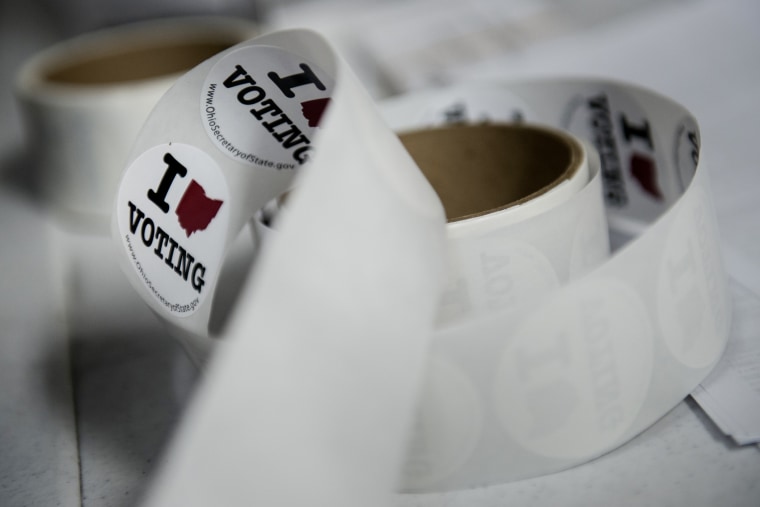A new federal lawsuit charges that a series of restrictive voting procedures put in place by Ohio Republicans aim to suppress the votes of minorities, students, and other Democratic-leaning groups. In response, Ohio's top election official is portraying the lawsuit as an effort by Hillary Clinton to gain an edge in a key 2016 swing state.
That’s a stretch -- but the skirmish nonetheless is putting the fight to set voting rules for the presidential election on center stage, eighteen months before voters go to the polls.
RELATED: Ohio Republicans push new voter ID bill
The suit challenges cuts to Ohio’s early voting opportunities, the elimination of same-day voter registration (known in Ohio as “Golden Week”), restrictive procedures for obtaining absentee ballots, and new rules that could lead to longer lines at the polls by reducing the number of voting machines that counties are required to have on hand. All those policies have been put in place over the last two years by Ohio’s Republican administration or its Republican-controlled legislature.
Unless these changes are blocked under the Voting Rights Act, the suit warns, “hundreds of thousands of Ohioans will find it substantially more difficult to exercise” their right to vote.
In 2012, more than 90,000 Ohioans voted during Golden Week, though most were already registered.
The suit was filed Friday in U.S. District Court for the Southern District of Ohio.
In 2004, Ohio was the poster-child for election problems, when a shortage of voting machines in minority and student-heavy neighborhoods led to all-day waits at the polls, causing large numbers of voters to give up in frustration. In response, the state expanded access by introducing early voting and same-day registration, among several other measures. That led to high turnout, especially among minorities and students, in 2008 and 2012, when Barack Obama won the state. Now, the lawsuit argues, Republicans are deliberately aiming to reverse that progress in order to suppress Democratic votes.
Helping to bring the case is Marc Elias, a veteran Democratic election lawyer who serves as chief counsel to Hillary Clinton’s presidential campaign.
Secretary of State Jon Husted, a Republican and a defendant in the lawsuit, has seized on Elias’ involvement to frame it as a Clinton-backed political scheme.
“I suspect Mrs. Clinton’s attorney may have filed his suit in the wrong state as Ohio has ample early voting hours,” Husted said in a statement Monday. “Perhaps he intended to sue Hillary’s home state of New York where they have no early voting days or hours. ... Mrs. Clinton’s political associates are simply intending to interject chaos into Ohio’s nationally recognized voting system.”
True the Vote, a tea party linked group that supports restrictive voting rules, sent out a fundraising appeal Tuesday warning that "Hillary Clinton's attorney" had filed suit over Ohio's voting rules, and adding: "The stage is being set right now for a 2016 ballot box battle unlike anything we’ve ever seen."
"Mrs. Clinton’s political associates are simply intending to interject chaos into Ohio’s nationally recognized voting system."'
In an email to msnbc, Elias rejected the implication that the lawsuit is a political ploy.
"My firm and I have brought many lawsuits throughout the country to vindicate the right to vote," Elias wrote. "Our lawsuit is on behalf to the plaintiffs listed in the complaint. It is unfortunate that Secretary Husted chose to respond with a political attack rather than working to remedy the problems identified in our suit.
Indeed, Elias has been among several lawyers involved in challenging North Carolina’s restrictive 2013 voting law, a case that's currently pending.
And the new lawsuit is hardly the first challenge to the strict voting rules ushered in by Ohio Republicans. An earlier Voting Rights Act lawsuit, led by the American Civil Liberties Union and the NAACP, challenged the early voting cuts and the elimination of Golden Week. A federal judge last year struck down the changes, finding that they discriminated against minorities, who are more likely than whites to use those methods of voting. But that ruling was blocked on appeal. Last month, a settlement restored some though not all of the reduced early voting hours, and let stand the elimination of Golden Week. It also created uniform voting hours for counties across the state.
RELATED: Settlement reverses some cuts to Ohio early voting
The new lawsuit argues that last month’s settlement doesn’t do enough to counter the discrimination caused by the array of restrictive procedures Ohio has put in place. And it claims that forcing counties to set uniform hours leads to longer lines in more populous urban counties, since counties can provide only one early voting location.
There may even be more restrictions in the pipeline. Late last month, Republican lawmakers introduced a voter ID bill -- their third attempt since 2011 to impose a photo ID requirement.
